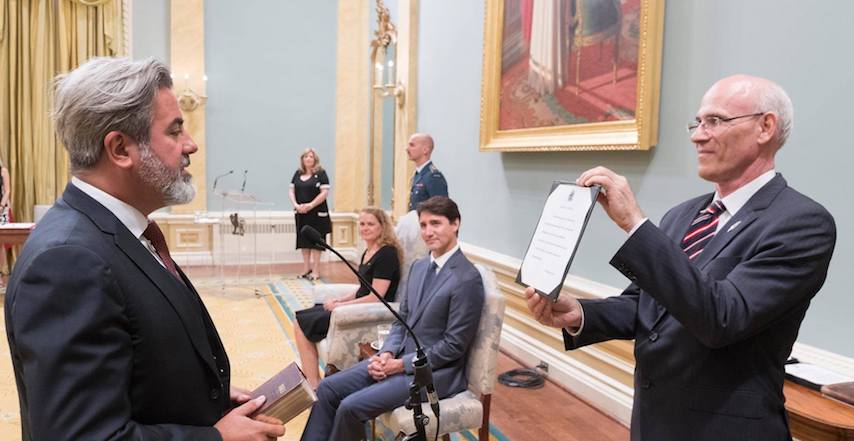It’s hard to take Canada’s new Heritage Minister Pablo Rodriguez seriously after repeated and avoidable missteps in the handling of his new portfolio.
Two weeks ago, the Globe and Mail queried Rodriguez about a series of closed-door consultations on racism that had recently been quietly launched by Heritage Canada. Ironically, Rodriguez claimed to the Globe and Mail that “Canada is not a racist society, wherever one lives.” While Rodriguez walked back that odd statement a few days later, it was only one of many perplexing and disappointing things that have happened in recent weeks.
As far as Heritage Canada’s new consultations about racism, it’s difficult to have a warm fuzzy feeling. First, they are shrouded in secrecy. The public is not made aware of when they will take place, or who has been invited. For community groups left on the outside, there is no obvious mechanism to join the consultations — hardly a good recipe when the topic is racism.
Heritage has scheduled 22 consultations before the end of the year, apparently as part of an initiative to develop a new national anti-racism strategy. A new “national plan” may be needed, but Rodriguez can hardly pretend that the problem is not well understood. The witnesses brought before Parliament’s Committee on Canadian Heritage for the M-103 report last year largely agreed not only on the core challenges facing Canada’s religious minorities, but also on the steps the government should take to address them. The recommendations set forth by the Committee this past February likely came as no surprise to the racism experts at Heritage Canada.
Rodriguez and Heritage claim that the secrecy is required to enable “focused, meaningful and safe conversations” among community members, experts, academics, and others. But Parliament’s Heritage Committee managed to meet with similar stakeholders over several months in 2017 without incident, despite the rancour around motion M-103 which initially triggered the study.
In fact, Heritage’s new consultations seem largely redundant with the work of the Parliamentary Committee. In Parliament’s initiative, 15 different meetings were held with members of religious communities, cultural communities, lawyers, human rights experts, law enforcement and other interested parties. That effort — conducted openly — resulted in 30 solid recommendations addressing dozens of the challenges facing Canada’s religious and cultural minorities.
In another perplexing assertion, Rodriguez told the Globe and Mail that the secret consultations are designed to “focus on concrete solutions” and avoid a debate over the issue of “systemic” racism. Immediately contradicting himself, Rodriguez went on to claim he wanted to tackle problems like “higher unemployment and incarceration rates among members of particular communities”: textbook examples of systemic racism.
For anyone not invited to the invitation-only consultations, Heritage Canada launched an online survey to gather input from concerned members of the public. But if secretive, invitation-only consultations were questionable, the on-line survey is even more inadequate. Seemingly set up to mollify players who have been excluded from the closed sessions, the survey has serious flaws and will be useless in any serious study of racism in Canada.
In the survey, Participants are asked to “agree” or “disagree” with about 30 largely unrelated statements. Surprisingly, the survey gathers no demographic data on participants, so all answers are void of context. Thus, if one disagrees with the survey statement, “I think the jury process is fair,” the survey results will be unable to correlate this to the race, religion, age, sex, or location of the respondent.
The flaws with Heritage’s online survey are too numerous to describe in a brief article. Another problem is that there is nothing to prevent the same individual from taking the survey multiple times. Yet another issue is that respondents are offered only a binary choice — agree or disagree — to broad, complex statements about discrimination, poverty, employment, and other issues. And in one usual twist, the “survey” is apparently designed to evolve, where respondents agree or disagree with statements from previous participants. Even if it were a serious effort, Heritage Canada has apparently dedicated no marketing funds to advertise the survey. Practically no external links points to the government survey so the response is likely to be paltry. Of course, even if well-meaning Canadians do take the time to track down this awkward on-line “survey”, Heritage Canada will still be unable to glean any useful data from the results.
To justify his approach, Rodriguez claims that Heritage wants to “get to the bottom of things without getting into a political debate.” Sadly unbeknownst to Rodriguez, racism has been “political” in Canada for years, since before Confederation itself. The M-103 brouhaha around Islamophobia in 2017, for example, went viral largely because Conservatives seized on it for partisan gain during their leadership race. A motion on Islamophobia in the House just four months earlier passed in seconds with unanimous consent. And in another recent example, Coalition Avenir Québec announced its intent to pass a law banning the wearing of religious symbols by civil servants just the day after it won the Quebec election. Racism apolitical Mr. Rodriguez? Think again!
But politics may be exactly what Rodriguez is playing himself as he launches Heritage into a lengthy exercise of consultations and supposed analysis. What better way to bury the debate and avoid any tough decisions until after the federal election slated for next fall.
Many of Canada’s racialized and religious minorities agonized over successive Harper governments waiting for an improvement in their social outlook. If Trudeau delays action beyond the next election cycle, these groups have good reason not only to be disappointed, but to seek alternative recourse for their grievances. Sadly, in the meantime, they face the spectre of continued obstacles to equitable employment, government services, and social justice.
Image: Pablo Rodriguez/Facebook
Help make rabble sustainable. Please consider supporting our work with a monthly donation. Support rabble.ca today for as little as $1 per month!





